- Home
- W. Somerset Maugham
The Summing Up Page 13
The Summing Up Read online
Page 13
When for days you have been going through a mountain pass, a moment comes when you are sure that after winding round the great mass of rock in front of you, you will come upon the plain; but instead you are faced with another huge crag and the weary trail continues; surely after this you will see the plain; no; the path winds on and another mountain bars your way. And then suddenly it lies before you. Your heart exults; there it stretches wide and sunny; the oppression of the mountains is lifted from your shoulders and with exhilaration you breathe the more spacious air. You have a wonderful sense of freedom. So I felt when I had done with my last play.
I could not tell whether I was free from the theatre for good and all, for the author is the slave of what, for want of a more modest word, I am forced to call his inspiration, and I could not be certain that a theme would not some day occur to me that I could not but write in the form of a play. I hoped not. For I was possessed of a notion which I cannot expect the reader to think other than foolishly arrogant. I had had all the experience that it seemed possible the theatre could give me. I had made as much money as I needed to live in the sort of way that pleased me and to provide for such as had claims on me. I had won a great notoriety and perhaps even a passing fame. I might have been satisfied. But there was one thing more I wanted to achieve, and this it seemed to me I could not hope to reach in the drama. Perfection. I looked not at my own plays, of whose faults no one could be more irritably conscious than I, but at the plays that have come down to us from the past. Even the greatest have grave defects. You have to make excuses for them by considering the conventions of the time and the conditions of the stage for which they were written. The great Greek tragedies are so far from us and interpret a civilisation that is now so strange that it is hard to judge them candidly. It has seemed to me that perhaps Antigone came very near perfection. In the modern drama I think no one on occasion approached it more closely than Racine. But at the cost of how many a limitation! It was a cherry stone that he carved with infinite skill. Only idolatry can refuse to see the great shortcomings in the conduct and sometimes in the characterisation of Shakespeare’s plays; and this is very comprehensible since, as we know, he sacrificed everything to effective situation. All these plays were written in imperishable verse. When you come to the modern prose drama and look for perfection you will not find it. I suppose it will be admitted that Ibsen is the greatest dramatist the last hundred years have seen. For all the vast merits of his plays, how poverty-stricken was his invention, how repetitive his characters, and how silly, when you go a little below the surface, are too many of his subjects! It looks as though defects of one sort or another were inherent in the art of drama. To get one result you must sacrifice another, so that to write a play perfect in all its particulars, in the interest and significance of its theme, in the subtlety and originality of its characterisation, in the plausibility of its intrigue and in the beauty of its dialogue, is impossible. It seemed to me that in the novel and in the short story perfection had been sometimes achieved, and though I could scarcely hope to reach it, I had a notion that in those mediums I could come nearer to it than I had any chance of doing in the drama.
43
THE first novel I wrote was called Liza of Lambeth. It was accepted by the first publisher to whom I sent it. For some time Fisher Unwin had been bringing out in what he called The Pseudonym Series a number of short novels which had attracted a good deal of attention; among them were those of John Oliver Hobbs. They were thought witty and audacious. They made the author’s name and confirmed the prestige of the series. I wrote two short stories which together, I thought, would make a volume of a size suitable for this collection and sent them to Fisher Unwin. After some time he returned them, but with a letter asking me if I had not a novel I could submit to him. This was so great an encouragement that I immediately sat down and wrote one. Since I was working at the hospital all day I could only write in the evening. I used to get home soon after six, read my Star, which I bought at the corner of Lambeth Bridge, and as soon as the table was cleared after an early meal, set to work.
Fisher Unwin was hard on his authors. He took advantage of my youth, my inexperience, and my delight at having a book accepted, to make a contract with me whereby I was to get no royalty at all till he had sold so many copies; but he knew how to push his wares and he sent my novel to a number of influential persons. It was widely, though diversely, reviewed, and Basil Wilberforce, afterwards Archdeacon of Westminster, preached about it in the Abbey. The Senior Obstetric Physician at St. Thomas’s Hospital was sufficiently impressed by it to offer me a minor appointment under him, for soon after it appeared I passed my final examinations; but this, exaggerating its success and determined to abandon the medical profession, I unwisely refused. A second edition was called for within a month of publication, and I had no doubt that I could easily earn my living as a writer. I was somewhat shaken when, a year later, on my return from Seville, I received from Fisher Unwin a cheque for my royalties. It amounted to twenty pounds. If I may judge by its continuing sales Liza of Lambeth is still readable, but any merit it may have is due to the luck I had in being, by my work as a medical student, thrown into contact with a side of life that at that time had been little exploited by novelists. Arthur Morrison with his Tales of Mean Streets and A Child of the Jago had drawn the attention of the public to what were then known as the lower classes and I profited by the interest he had aroused.
I knew nothing about writing. Though for my age I had read a good deal, I had read without discrimination, devouring one after the other books I had heard of to find out what they were about, and though I suppose I got something out of them, it was the novels and short stories of Guy de Maupassant that had most influence on me when I set myself to write. I began to read them when I was sixteen. Whenever I went to Paris I spent my afternoons in the galleries of the Odéon browsing among the books there. A certain number of Maupassant’s books had been reissued in little volumes at seventy-five centimes and these I bought; but the others cost three francs fifty, a sum that I could not afford, so I used to take a book out of the shelves and read what I could of it. The attendants in their pale grey smocks took no notice of me and it was often possible when none of them was looking to cut a page and continue the narrative without interruption. Thus I managed to read most of Maupassant before I was twenty. Though he does not enjoy now the reputation he did then it must be admitted that he had great merits. He was lucid and direct, he had a sense of form, and he knew how to get the utmost dramatic value out of the story he had to tell. I cannot but think that he was a better master to follow than the English novelists who at that time influenced the young. In Liza of Lambeth I described without addition or exaggeration the people I had met in the Out-Patients’ Department at the Hospital and in the District during my service as an Obstetric Clerk, the incidents that had struck me when I went from house to house as the work called, or, when I had nothing to do, had seen on my idle saunterings. My lack of imagination (for imagination grows by exercise and contrary to common belief is more powerful in the mature than in the young) obliged me to set down quite straightforwardly what I had seen with my own eyes and heard with my own ears. Such success as the book had was due to a lucky chance. It augured nothing for my future. But this I did not know.
Fisher Unwin pressed me to write another much longer book about the slums. He told me that was what the public wanted from me and prophesied that it would have, now that I had broken the ice, a far greater success than Liza of Lambeth. But this was not in my ideas at all. I was ambitious. I had a feeling, I do not know where I got it, that you must not pursue a success, but fly from it; and I had learnt from the French to set no great store on the roman régional. I was no longer interested in the slums once I had written a book about them, and I had indeed already finished a novel of a very different sort. Fisher Unwin must have been dismayed when he received it. It was a novel set in Italy during the Renaissance and it was founded on a story I had read
in Machiavelli’s History of Florence. I wrote it because of some articles by Andrew Lang that I read on the art of fiction. In one of them he argued, very convincingly to me, that the historical novel was the only one that the young author could hope to write with success. For he could not have sufficient experience of life to write of contemporary manners; history provided him with a story and characters, and the romantic fervour of his young blood gave him the dash that was needed for this sort of composition. I know now that this was nonsense. In the first place it is not true that the young author has not sufficient knowledge to write about his contemporaries. I do not suppose one ever in after life knows people so intimately as those with whom one’s childhood and early youth have been passed. One’s family, the servants with whom so much of a child’s life is spent, one’s masters at school, other boys and girls—the boy knows a great deal about them. He sees them with directness. Adults discover themselves, consciously and unconsciously, to the very young as they never do to other adults. And the child, the boy, is aware of his environment, the house he lives in, the countryside or the streets of the town, in a detail that he can never realize again when a multitude of past impressions has blurred his sensibilities. The historical novel calls surely for a profound experience of men to create living people out of those persons who with their different manners and different notions at first sight seem so alien to us; and to recreate the past needs not only a vast knowledge but an effort of imagination that is hardly to be expected in the young. I should have said that the truth was exactly contrary to what Andrew Lang said. The novelist should turn to the historical novel towards the end of his career, when thought and the vicissitudes of his own life have brought him knowledge of the world, and when, having for years explored the personalities of people around him, he has acquired an intuition into human nature that will enable him to understand and so to recreate the figures of a past age. I had written my first novel of what I knew, but now, seduced by this bad advice, set to work on a historical romance. I wrote it in Capri, during the long vacation, and such was my ardour that I had myself awakened every morning at six and wrote with perseverance till hunger forced me to break off and have breakfast. I had at least the sense to spend the rest of the morning in the sea.
44
THERE is no need for me to speak of the novels I wrote during the next few years. One of them, Mrs. Craddock, was not unsuccessful, and I have reprinted it in the collected edition of my works. Of the others two were novelisations of plays that I had failed to get produced and for long they lay on my conscience like a discreditable action; I would have given much to suppress them. But I know now that my qualms were unnecessary. Even the greatest authors have written a number of very poor books. Balzac himself left a good many out of the Comédie Humaine, and of those he inserted there are several that only the student troubles to read; the writer can rest assured that the books he would like to forget will be forgotten. I wrote one of these books because I had to have enough money to carry me on for the following year; the other because I was at the time much taken with a young person of extravagant tastes, and the gratification of my desires was frustrated by the attentions of more opulent admirers who were able to provide the luxuries that her frivolous soul hankered after. I had nothing much to offer but a serious disposition and a sense of humour. I determined to write a book that would enable me to earn three or four hundred pounds with which I could hold my own with my rivals. For the young person was attractive. But even if you work hard it takes a long time to write a novel; you have to get it published; then publishers do not pay you till many months have elapsed. The result was that by the time I received the money the passion that I had thought would last for ever was extinct and I had no longer the slightest wish to spend it in the way I had intended. I went to Egypt on it.
With these two exceptions the books I wrote during the first ten years after I became a professional writer were the exercises by which I sought to learn my business. For one of the difficulties that beset the professional writer is that he must acquire his craft at the expense of the public. He is constrained to write by the instinct within him, and his brain teems with subjects. He has not the skill to cope with them. His experience is narrow. He is crude, and he does not know how to make the best of such gifts as he has. And when he has finished his book he must publish it if he can, partly of course to get the money to live on; but also because he does not know what it is like till it is in print, and he can only find out his errors from the opinions of his friends and the criticisms of the reviewers. I have always heard that Guy de Maupassant submitted whatever he wrote to Flaubert and it was not till he had been writing for some years that Flaubert allowed him to publish his first story. As all the world knows it was that little masterpiece called Boule de Suif. But this is an exceptional case. Maupassant had a post in a government office that provided him both with a living and with sufficient leisure to write. There are few people who would have the patience to wait so long before trying their luck with the public and fewer still who can have had the good fortune to find so conscientious and great a writer as Flaubert to direct them. For the most part writers waste in this way subjects that they could have made good use of if they had not treated them till they had a greater knowledge of life and a more intimate acquaintance with the technique of their art. I sometimes wish that I had not had the good fortune to get my first book accepted immediately, for then I should have continued with medicine; I should have got the usual hospital appointments, gone as assistant to general practitioners in various parts of the country, and done locums; I should thus have acquired a mass of valuable experience. If my books had been refused one after the other I should have come before the public at last with work less imperfect. I regret that I had no one to guide me; I might have been spared much misdirected effort. I knew a few literary people, not many, for even then I had a feeling that their company, though pleasant enough, was unprofitable to the author, and I was too shy, too arrogant and too diffident, to seek their counsel. I studied the French novelists more than the English, and having got what I was capable of getting from Maupassant, turned to Stendhal, Balzac, the Goncourts, Flaubert and Anatole France.
I tried various experiments. One of them at that time had a certain novelty. The experience of life I was for ever eagerly seeking suggested to me that the novelist’s method of taking two or three people, or even a group, and describing their adventures, spiritual and otherwise, as though no one else existed and nothing else was happening in the world, gave a very partial picture of reality. I was myself living in several sets that had no connection with one another, and it occurred to me that it might give a truer picture of life if one could carry on at the same time the various stories, of equal importance, that were enacted during a certain period in different circles. I took a larger number of persons than I had ever sought to cope with before and devised four or five independent stories. They were attached to one another by a very thin thread, an elderly woman who knew at least one person in each group. The book was called The Merry-Go-Round. It was rather absurd because owing to the influence on me of the æsthetic school of the nineties I made everyone incredibly beautiful, and it was written in a tight and affected manner. But its chief defect was that it lacked the continuous line that directs the reader’s interest; the stories were not after all of equal importance and it was tiresome to divert one’s attention from one set of people to another. I failed from my ignorance of the very simple device of seeing the diverse events and the characters that took part in them through the eyes of a single person. It is a device which of course the autobiographical novel has used for centuries, but which Henry James has very usefully developed. By the simple process of writing he for I and stepping down from the omniscience of an all-knowing narrator to the imperfect acquaintance of a participator he showed how to give unity and verisimilitude to a story.
45
I HAVE a notion that I was more slow to develop than most writers. Around the year
s that ended the old century and began the new one I was looked upon as a clever young writer, rather precocious, harsh and somewhat unpleasant, but worth consideration. Though I made little money out of them my books were reviewed at length and conscientiously. But when I compare my early novels with those that ate written by young men now I cannot but see that theirs are vastly more accomplished. The ageing writer does well to keep in touch with what the young do and from time to time I read their novels. Girls still in their teens, youths at the university, produce books that seem to me well-written, well-composed and ripe with experience. I do not know whether the young mature sooner than they did forty years ago or whether it is that the art of fiction has in that time so much advanced that it is now as easy to write a good novel as then it was difficult to write even a mediocre one. If one takes the trouble to look through the volumes of The Yellow Book, which at that time seemed the last thing in sophisticated intelligence, it is startling to discover how thoroughly bad the majority of its contributions were. For all their parade these writers were no more than an eddy in a backwater and it is unlikely that the history of English literature will give them more than a passing glance. I shiver a little when I turn those musty pages and ask myself whether in another forty years the bright young things of current letters will appear as jejune as do now their maiden aunts of The Yellow Book.

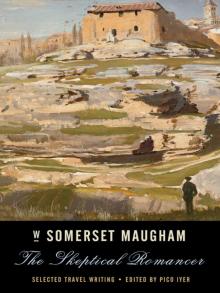 The Skeptical Romancer: Selected Travel Writing
The Skeptical Romancer: Selected Travel Writing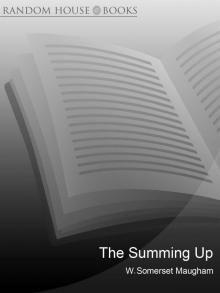 The Summing Up
The Summing Up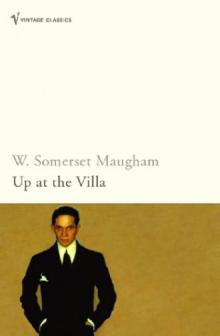 Up at the Villa
Up at the Villa The Razor's Edge
The Razor's Edge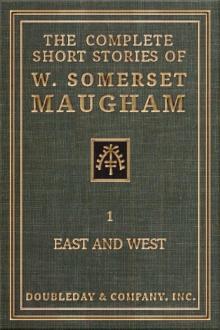 The Complete Short Stories of W. Somerset Maugham: East and West (Vol. 1 of 2))
The Complete Short Stories of W. Somerset Maugham: East and West (Vol. 1 of 2))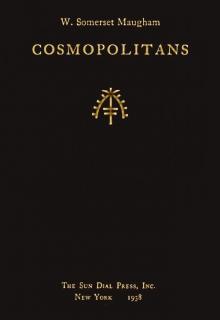 Cosmopolitans
Cosmopolitans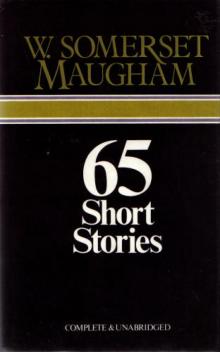 65 Short Stories
65 Short Stories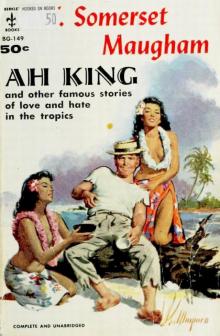 Ah King (Works of W. Somerset Maugham)
Ah King (Works of W. Somerset Maugham)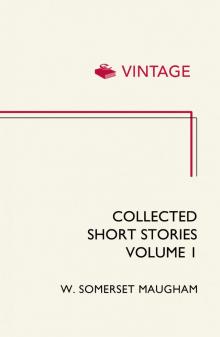 Collected Short Stories: Volume 1
Collected Short Stories: Volume 1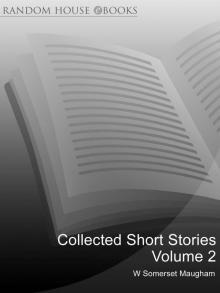 Collected Short Stories Volume 2
Collected Short Stories Volume 2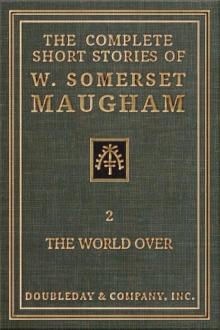 The Complete Short Stories of W. Somerset Maugham - II - The World Over
The Complete Short Stories of W. Somerset Maugham - II - The World Over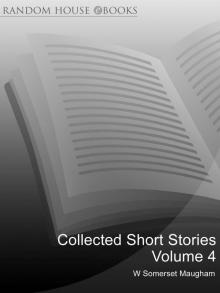 Collected Short Stories Volume 4
Collected Short Stories Volume 4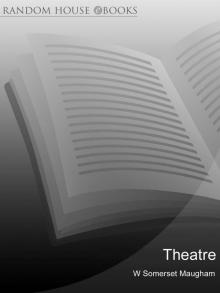 Theatre
Theatre Short Stories
Short Stories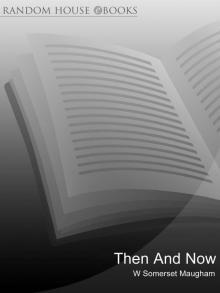 Then and Now
Then and Now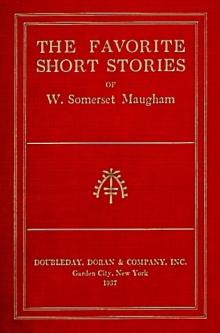 The Favorite Short Stories of W. Somerset Maugham
The Favorite Short Stories of W. Somerset Maugham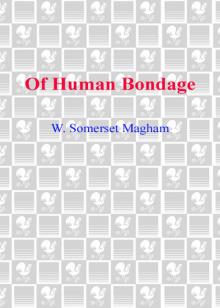 Of Human Bondage
Of Human Bondage The Magician
The Magician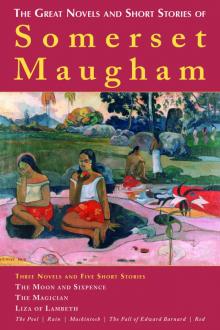 The Great Exotic Novels and Short Stories of Somerset Maugham
The Great Exotic Novels and Short Stories of Somerset Maugham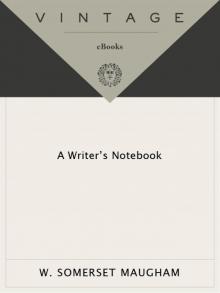 A Writer's Notebook
A Writer's Notebook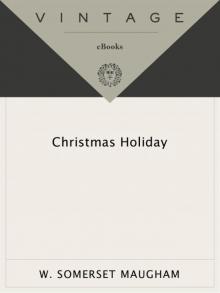 Christmas Holiday
Christmas Holiday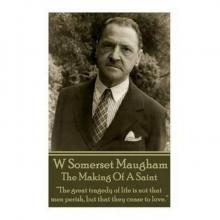 The Making of a Saint
The Making of a Saint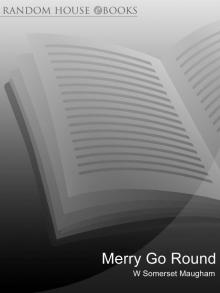 Merry Go Round
Merry Go Round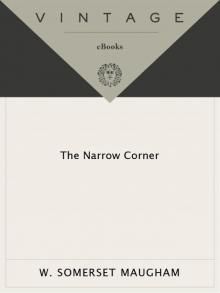 The Narrow Corner
The Narrow Corner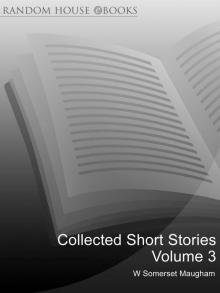 Collected Short Stories Volume 3
Collected Short Stories Volume 3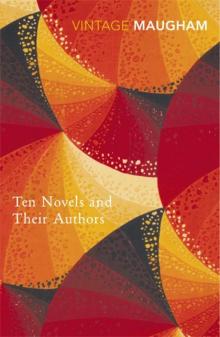 Ten Novels and Their Authors
Ten Novels and Their Authors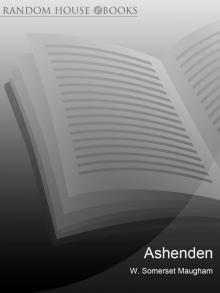 Ashenden
Ashenden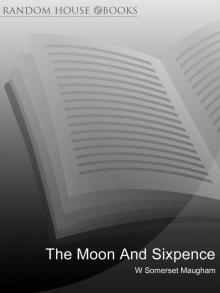 The Moon and Sixpence
The Moon and Sixpence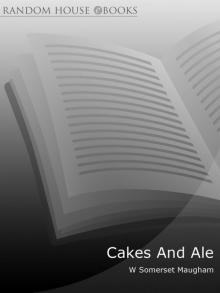 Cakes and Ale
Cakes and Ale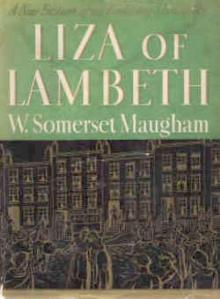 Liza of Lambeth
Liza of Lambeth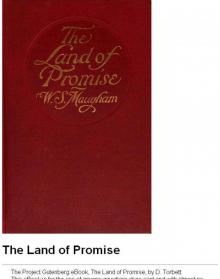 The Land of Promise: A Comedy in Four Acts (1922)
The Land of Promise: A Comedy in Four Acts (1922)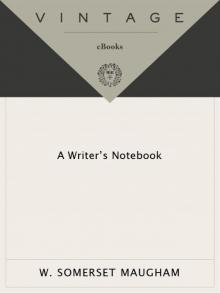 A Writer's Notebook (Vintage International)
A Writer's Notebook (Vintage International)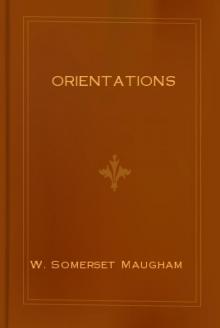 Orientations
Orientations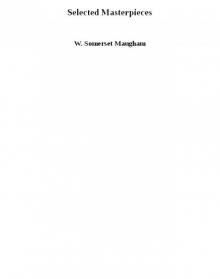 Selected Masterpieces
Selected Masterpieces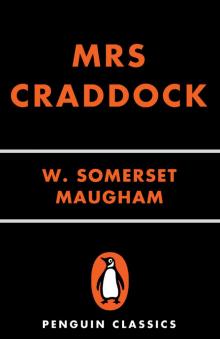 Mrs Craddock
Mrs Craddock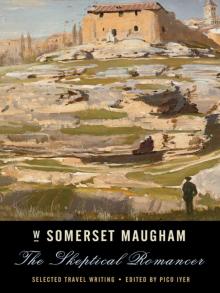 The Skeptical Romancer
The Skeptical Romancer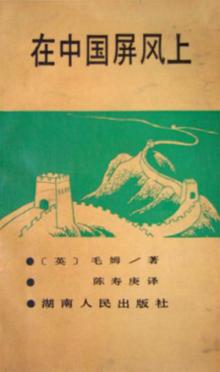 On a Chinese Screen
On a Chinese Screen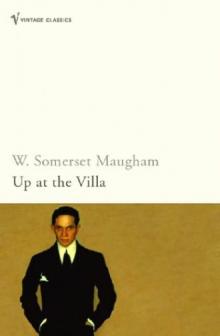 (1941) Up at the Villa
(1941) Up at the Villa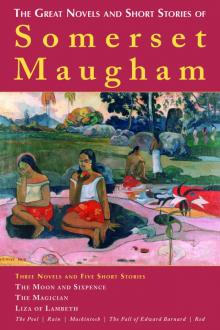 The Great Novels and Short Stories of Somerset Maugham
The Great Novels and Short Stories of Somerset Maugham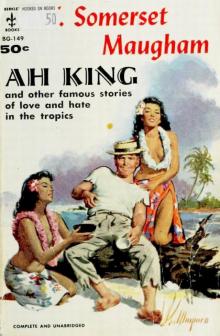 Ah King
Ah King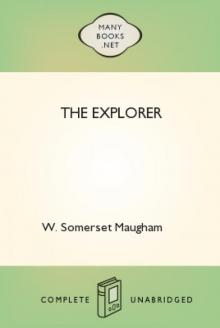 The Explorer
The Explorer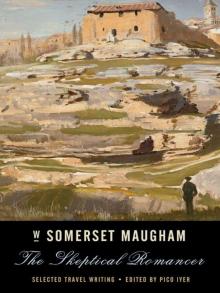 The Skeptical Romancer: Selected Travel Writing (Vintage Departures)
The Skeptical Romancer: Selected Travel Writing (Vintage Departures)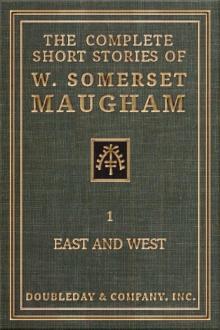 The Complete Short Stories of W. Somerset Maugham - I - East and West
The Complete Short Stories of W. Somerset Maugham - I - East and West